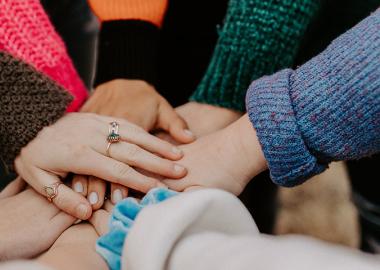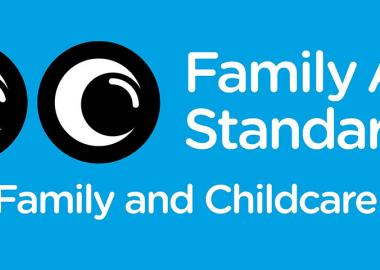As music groups rise to the digital challenge and find innovative ways to move the musical and social aspect of their groups to an online space, it’s important they remember the responsibilities they have to their members too.
Safeguarding is just as important online as it is ‘in person’, and the principles remain the same. It is about providing a space where people feel safe and are protected from harm. To help create this space you should have a policy and procedures in place to help everyone understand how the group operates and what is expected of them. It is mostly a case of simple common sense measures and shouldn’t be too onerous for anyone involved.
You can read more about the general principles of safeguarding and your responsibilities in Safeguarding: what are your responsibilities?
This guidance will focus on the specifics of online safeguarding.
What do we need to consider?
While the principles of safeguarding are the same for online or in person rehearsals, some measures and procedures will be different.
There is lots of safeguarding guidance available for one-to-one online teaching. However, many of our groups are holding larger group rehearsals, and whilst much of the one-to-one advice is applicable there are different considerations for group rehearsals.
Someone in charge
The committee is responsible for safeguarding and someone on the committee should take the lead and be the main contact. You may already have someone in this position - consider if they have capacity to take on online safeguarding too, or whether someone else would be better placed to help them.
Your platform
Ownership: Some groups use their MD’s Zoom (or equivalent) account for rehearsals. As the group and committee are responsible for safeguarding, it is better for the group to have their own account because:
- the group will be in charge and can ensure effective safeguarding (most platforms allow you to make the MD a co-host to run the musical side of things).
- the online relationship will be between the group and its members, as opposed to the MD and members.
Know your platform: Understanding how your platform works is really important. All platforms offer features to help you manage your rehearsals and meetings and provide a safe environment. You need to know how they work to use them effectively. Make sure this knowledge is shared so you always have at least one expert present per rehearsal. Consider how a session is set up, and how it is managed once it has started.
- Create a unique meeting ID and password for each event
- Don’t use the Personal meeting room ID option in Zoom
- Use a waiting room to control who enters
- Limit who can share their screen
- Limit who can record the session
- Understand how to mute and remove people
- Understand how to turn the chat off
See our Zoom guidance for more information
Make sure your members understand the platform
- Ask them to have a username that clearly says who they are and to set it up before they join the session - this will help you identify who to let in.
- Make sure they understand how to control when they can be seen and heard.
Code of conduct
Creating a safe environment is everyone’s responsibility and having a code of conduct so people know what is expected of them can help with this. Your ‘normal’ guidance about how people speak and behave towards each other will all still apply online, but there are extra considerations too.
- What people wear - it can be easy to fall into the habit of wearing more casual clothing in online meetings, or perhaps smart on the top and pyjamas on the bottom. If clothing would not be appropriate for an in-person event it isn't appropriate for an online one.
- What people can see - you are inviting people into a small part of your home. Ask everyone to think about what is visible in their background. There is always the option for people to use the 'blur background' function
- Sharing content - online meetings give people the chance to share content such as posting links in the chat. Ask people to consider the whole group when posting content.
Specific procedures for young people joining online rehearsals
If young people are joining your sessions make sure their parents/carers know what’s going on and have given their permission.
Before the session: Any communication should be with either just parents/carers or both the young person and parents/carers together. They should be aware of:
The experience:
- What the activity is - what will the young person see, hear and be doing?
- Who else will be there?
Practicalities:
- When is it and how long it will last?
- How to access it (e.g ID and password) and what devices are needed?
- Make sure parents/carers know who to contact in the group if they want to discuss anything.
Outcomes:
- If the session is being recorded or if the young person is contributing to a virtual performance, do they understand what this means and where the content will be shared? You should have permission from parents/carers if it will be shared publicly.
During the session:
- Turn the waiting room function on, and don’t admit a young person to the session until at least two adults have joined.
- Ask young people to join via their parents’ or a shared family device and account.
- Consider asking a parent to be there at the start. For one-to-one lessons some advice suggests asking the parent to stay the whole time. This is less important for group sessions, but it can be useful for the parent/carer to come back in at the end. This will also depend on the age of the young person, for example it might not be necessary for a 17-year-old who would normally make their own way in person to your group.
- Ask young people to keep the door to the room they are in open so that they can be seen by their parents/carers if necessary.
Recording the rehearsal: Advice for teachers doing one-to-one sessions is to record the session (with permission). For groups, recording the rehearsal as a record is not so important. There is also the additional consideration of making sure participants can’t record the rehearsal. If you want to record the rehearsal for musical reasons, make sure you let everyone know and have permission from parents/carers of young people.
Breakout rooms: Using breakout rooms as part of rehearsals may present some safeguarding challenges. Lots of groups have a ‘real life’ safeguarding procedure of never leaving a young person alone with an adult. This is a good principle to stick to in the online world. Breakout rooms could create some situations where this is out of your control.
- When opening a breakout room not everyone joins straight away (or indeed at all if they have technical problems).
- People can leave breakout rooms early and come back to the main room.
The risks here are small, but they are worth being aware of, and thinking about how you can manage them. There are some suggestions below - these need to be weighed up against risk and how they impact running your rehearsals.
- Have someone whose job it is to manage breakout rooms - they can easily monitor who is in which room.
- Assign adults to breakout rooms first - wait until they have successfully joined and then assign any young people.
- Use the main room as a breakout room (i.e. if you want 4 breakout sessions have 3 breakout rooms and the main room). This way, anyone leaving a breakout room will come back into the main room with other people (someone will have to monitor this and manage re-assigning people).
Ending meetings: The end of a meeting could also lead to a situation where one adult and one young person are alone. Think about your procedures for ending meetings; the simplest option is for the host to ‘end meeting for all.’ But if you would rather not do that, ensure that two adults stay online until everyone else has left, and remember that hosts can remove people too.
Adults at risk
Safeguarding is not just about young people, it is about providing a safe environment for everyone in your group. One area of potential increased risk is adults who are new to the online world and could be targeted by cyber criminals.
Procedures for raising concerns
An important part of any safeguarding policy is having procedures for how people can raise concerns and what to do if concerns are raised. These can be based on existing procedures but may need some modification for online activities.
- Consider how people can raise concerns privately during a session.
- What tools you have to deal with incidents during meetings (see ‘Your platform’ above).
What do we need to do?
Policies and procedures: If you already have a safeguarding policy and procedures document, adding a section that details specific online procedures will probably be sufficient.
However, if you will be doing online activity for a long time, having separate online safeguarding documents might be a good idea as it will help establish its importance and make sharing online specific content easier (they can of course refer to your general safeguarding documents).
If you don't already have general safeguarding documents in place, then you should think about creating something for online activities. This guidance, together with our general template policy, will help with this. You should also consider developing a general safeguarding policy for when you are back to normal.
Permissions: Asking parents/carers of young people for permissions relating to online activity is a good idea. You do not need to ask permission for each event - one catchall permission is fine. Make sure parents have all the info they need and understand what they need to do (see Specific procedures for young people joining online rehearsals above).
Share: when you have your online specific safeguarding documents make sure you share them with everyone concerned; members, parents/carers, MDs etc.
TOP FIVE TAKEAWAYS
1. Your committee is responsible for the safeguarding of the individuals in the group and anyone else who joins an online meeting.
2. Know your platform (ie. Zoom)
3. Ensure there is an online Code of Conduct
4. Ensure the safety of young people who join your online meetings and ensure that there is communication with their parents or carers
5. In one-to-one meetings with a young person, ensure they are in a room with the door open
Useful links
- Read our general Safeguarding guidance and template policy for an overview of the key principles.
- Orchestras for All has produced online safeguarding policies, guidance and practice.
- Music Mark has collected a list of useful advice about group and one-to-one teaching.
We hope you find this Making Music resource useful. If you have any comments or suggestions about the guidance please contact us. Whilst every effort is made to ensure that the content of this guidance is accurate and up to date, Making Music do not warrant, nor accept any liability or responsibility for the completeness or accuracy of the content, or for any loss which may arise from reliance on the information contained in it.










